link to page 1 link to page 1
 NOTE
Date
NOTE
Date
06 November 2018
Subject
Old Mangere Bridge
The Old Mangere Bridge opened to traffic in 1914. The bridge has suffered widespread deterioration over
the last 100 years. The combination of a severe marine environment and poor concrete quality with lack of
adequate concrete cover over the steel reinforcing has resulted in widespread corrosion of reinforcement
and spal ing of concrete. The bridge has been closed to motorised vehicles since 1983.
A detailed structural inspection undertaken in December 2015 reported that the bridge was in poor
condition, with significant areas of delamination of the concrete and extensive loss of section to the tensile
steel reinforcement. The bridge has had a number of boat strikes in the past, which have placed excessive
displacements and deflections on the structure, and resulted in emergency repairs. The inspection also
found that the majority of previous concrete repairs have failed or are brittle when struck with a hammer.
February 2016 - Structural Condition Assessed
Utilising the detailed inspection observations, a capacity assessment of the Old Mangere Bridge
1 and an
independent peer review
2 were undertaken. The bridge was assessed to have a barely adequate factor of
safety in the middle span and an inadequate factor of safety in the edge spans when a 3Kilopascal (KPa)
crowd load was applied. The 3KPa live load used in the 2016 assessment is a departure from the NZTA
Bridge manual where 5KPa is specified for crowd load. The Transport Agency’s view is that 3KPa is unlikely
to be acceptable if a future assessment of the structural capacity is undertaken. Both assessment reports
recommended limiting live load on the edge spans, which are in the worst condition.
April 2016 – Decision Made to Keep the Bridge Open
The NZ Transport Agency considered al the risks and opportunities (i.e. community, environmental, social
and technical) and decided that:
1. The Auckland Motorway Alliance (AMA) would implement necessary restrictions and monitoring to
keep the bridge open until the replacement bridge is built, which at that time was programmed to
be complete in 2018/19;
2. The programme of the replacement bridge was to be expedited.
The Transport Agency requested the AMA identify and implement the proposed temporary mitigation
measures, including:
•
Installation of fencing and signage to prevent people accessing the edge spans where the factor of
safety was assessed as inadequate;
•
Construction of steel collars and bracing on piles to strengthen heavily deteriorated piles;
•
Installation of real time monitoring to monitor deterioration and crowd loads;
•
Inspections and cloud survey to monitor the ongoing condition of the bridge.
1 Old Mangere Numerical Capacity Review January 2016
2 Old Mangere Bridge Superstructure and Pier Crosshead Beam Capacity Peer Review February 2016
link to page 2
May 2018 – Review of holding strategy
A key assumption behind the decision to implement the holding measures in 2016 was that the
replacement bridge would be completed and operational by 2019. The replacement bridge was
subsequently delayed due to the East-West Link review and the Light Rail project.
The AMA completed an independent review of the current bridge-holding strategy. The review of the
strategy
3 found that closure would eliminate the risk to the public, but could have negative feedback. The
report concluded that:
• the structure is not currently fit for purpose and is continuing to deteriorate as more of the
reinforcement becomes exposed
• it is hard to justify keeping the bridge open to the public for much longer without urgent
strengthening work taking place
• a well-used bridge in this condition would be closed immediately to eliminate the potential risk to
the public from a UK perspective.
The report recommended the Transport Agency undertake load testing with operational monitoring in
place and take a staged approach to close the bridge if the bridge passed the load test. If a staged approach
was taken, further restrictions would still be required post-load testing to narrow the width of usable
portion of the bridge to the minimum footpath and cycleway standards along the ful bridge.
July – October 2018 Load Test and Decision to Close
Upon receipt of the strategy review report, a workshop was held with structural experts to review the
status of the bridge in July 2018. The structural experts agreed that the bridge has deteriorated to a point
where rational assessment of the structure to determine its remaining life would be problematic i.e. there
are too many variables in the condition and material of the bridge to be confident in a theoretical
model. Load testing was suggested as an option to confirm if the bridge could remain open, and a load
testing methodology was developed and peer reviewed. There are three key issues associated with the
proposed load testing:
1. There is a risk of sudden failure of the bridge during the load testing, i.e. a span of the bridge could
suddenly col apse. This poses a health and safety risk to the workers implementing the load test.
2. It is possible hidden damages may exist in the bridge post load testing, making the structure unsafe
even though it may have looked like it passed the test.
3. Due to unknowns in the rate of corrosion and deterioration, the proposed load test should only be
relied upon for a maximum period of 2 years.
If the bridge passed the load test and the Transport Agency decided to keep the bridge open, the real time
monitoring system (tilt sensors) would need to be reinstated for ongoing monitoring of the bridge. The real
time monitoring system previously installed on the bridge from late 2016 to early 2018 has not worked
effectively and the Transport Agency has little confidence in reinstating this system. There would need to
be structural strengthening and additional fencing, which would take months to complete, as well as
ongoing monitoring (day time on-site security and remote cameras) to manage any risk of crowds.
3 Old Mangere Bridge Review of Current Strategy
2
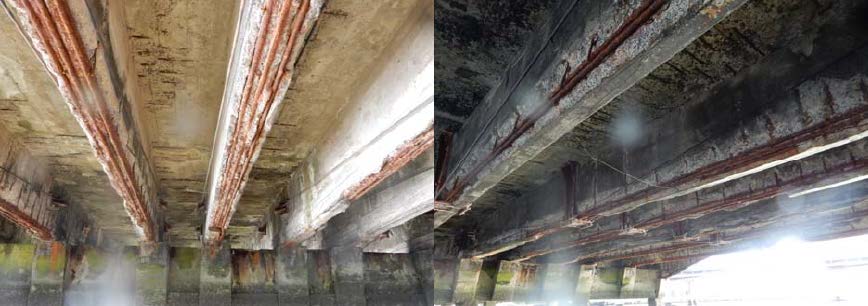
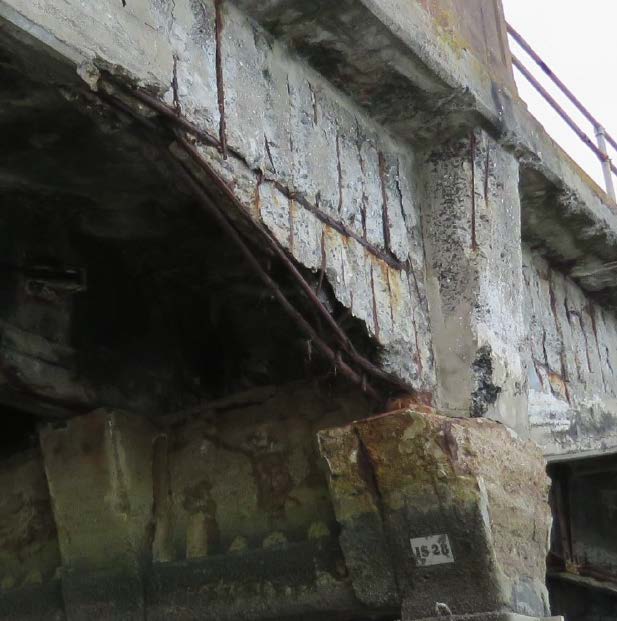
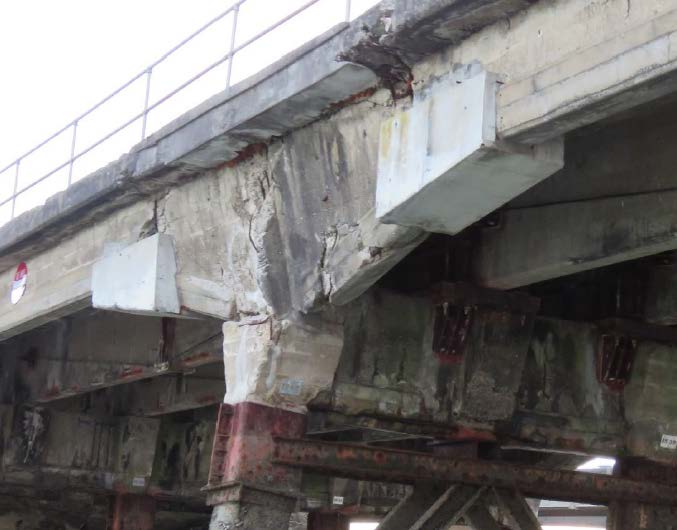
Based on the considerations above and the uncertainties of some of the testing results, the decision has
been taken not to proceed with load testing. Without verifying the current structural capacity, and having
public safety as paramount, the only option is to close the bridge.
Below are pictures that represent the current condition of the bridge including previous strengthening
works that have been completed previously to keep the bridge open.
3
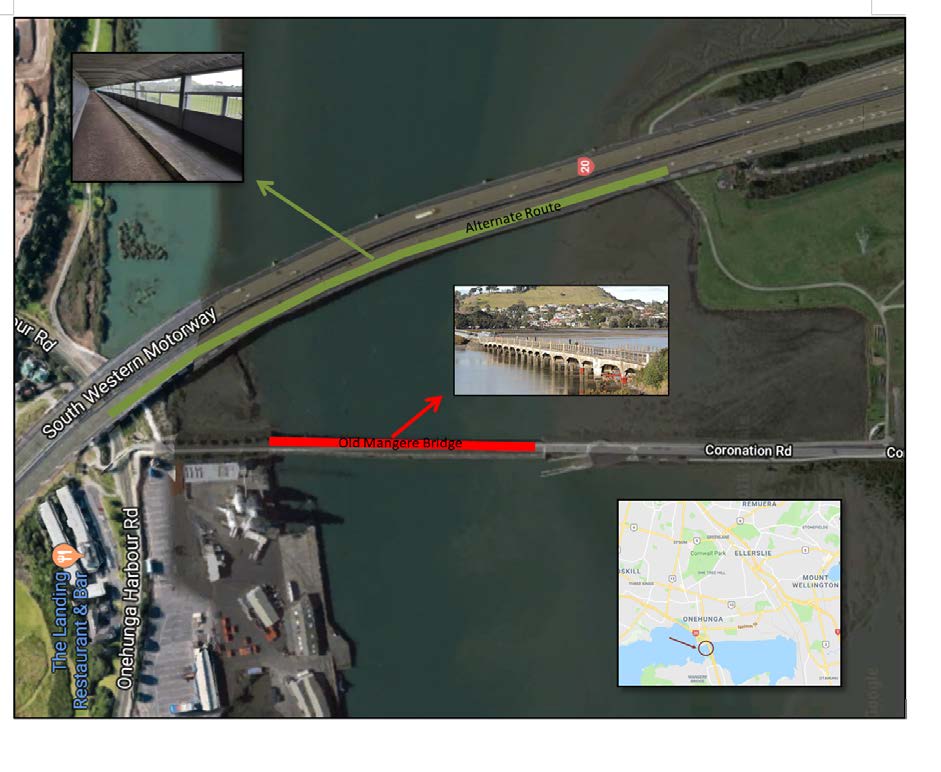
Attachment 1: Map of Old Mangere Bridge and Alternate Route
4
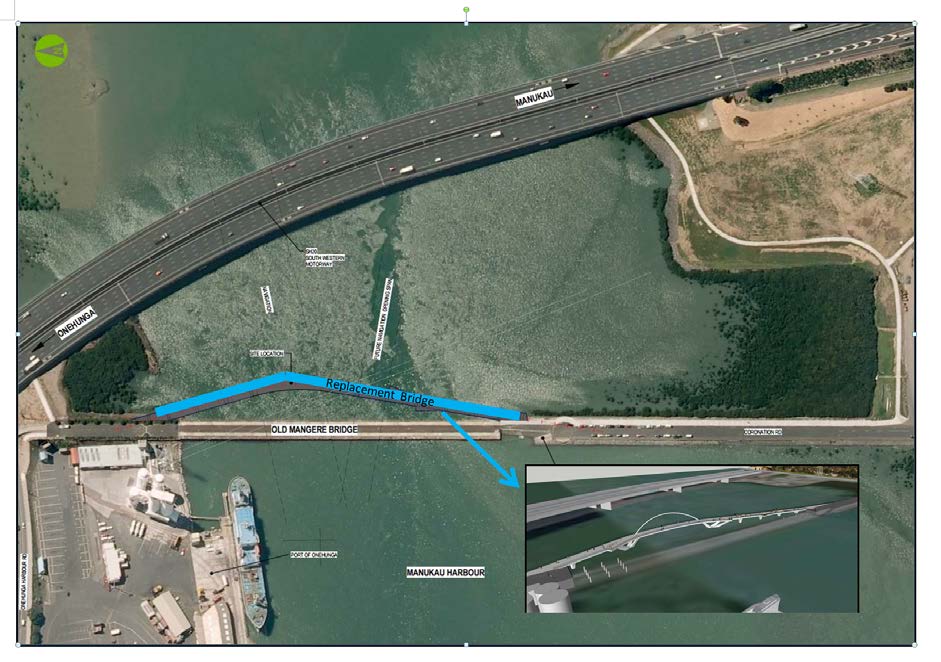
Attachment 2: Map of Replacement Bridge
5





